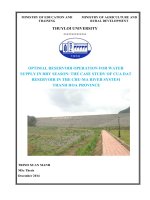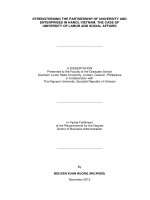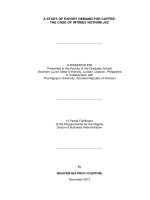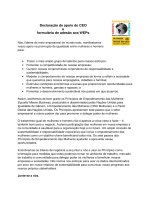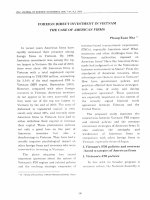COMPLAINT STATEMENT OF THE CASE (COMMON WEALTH OF MASSACHUSETTS)
Bạn đang xem bản rút gọn của tài liệu. Xem và tải ngay bản đầy đủ của tài liệu tại đây (300.07 KB, 7 trang )
COMMONWEALTH OF MASSACHUSETTS
SUFFOLK, ss
SUPERIOR COURT DEPT.
OF THE TRIAL COURT
DOCKET NO.
RALPH LOPEZ
Plaintiff
v.
WILLIAM FRANCIS GALVIN,
SECRETARY OF THE COMMONWEALTH
OF MASSACHUSETTS
Defendant
COMPLAINT
STATEMENT OF THE CASE
1.
The hand-count audit of paper ballots is the most fundamental mechanism by which
confidence is maintained in electronic ballot counting systems. The citizens’
organization VerifiedVoting.org states: “Such audits are arguably the most economical
component of a quality voting system, adding a very small cost for a large set of
benefits.” In the Massachusetts Democratic primary on March 1st, 2016, extraordinarily
pronounced anomalies were discovered by voting rights activists and experts. In the
relatively small number of districts where votes are still counted by hand, Bernie
Sanders won by an average of 17%. In contrast, overall in MA, where votes are mostly
counted by optical scan machine, Hillary Clinton was the victor, by 1.4%. This is true
even though hand-count districts are spread throughout the state, with no apparent
geographic or demographic distinction. In a further anomaly, and one seen consistently
across the country, exit polls showed Bernie Sanders doing significantly better than the
official results. Although exit polls err, they rarely err in the same direction, and by so
much, in relation to just one candidate. In contrast, all exit polls in the Republican
primaries in 2016 were a close match to final results. In the interest of preserving
confidence in the Massachusetts primary system, and in accordance with the
Massachusetts Public Records Law, plaintiff, a member of voting rights group Election
Justice Massachusetts, will request the opportunity to examine and count, under
supervision, the ballots in a small sampling of voting districts. Alternatively, plaintiff
requests that the court order a hand count of said districts, in a manner which allows the
MA voting rights team to discern and tabulate ballot markings themselves as the audit
progresses.
THE PARTIES
2. William J. Galvin is Secretary of the Commonwealth of Massachusetts, the
duly sworn officer overseeing the Elections Division of the state of
Massachusetts, with offices in Suffolk County.
3. Ralph Lopez is a US citizen, a resident of MA, registered voter, writer, and member
of Election Justice Massachusetts.
JURISDICTION
4. This Court has jurisdiction over this action pursuant to its power to address voting rights
disputes under the 14th Amendment of the US Constitution, which include voting rights in
both the general election and in party primaries. The US Supreme Court has held, in United
States v. Classic, that “the primary is by law made an integral part of the election
machinery." In Smith v. Allwright, the US Supreme Court reasoned that primary elections
are an integral component of general elections and the democratic process, and that
primaries must be seen as sanctioned by the state and are therefore subject to 14th and
15th Amendment scrutiny. The most famous instance of the judiciary asserting itself in fair
election issues is Bush v. Gore, when the Florida Supreme Court ordered a recount to
proceed despite state statutory limitations.
STATEMENT OF FACTS
st
5. On March 1 , 2016, “Super Tuesday,” Hillary Clinton was announced the winner of the
Massachusetts Democratic primary by 1.4%.
6. In towns where ballots were counted by hand, rather than optical scan machine, Bernie
Sanders was the winner by an average of 17%. These towns are not contiguous and are
across the state, from the New York border to the Cape.
7. In MA, exit polls showed Bernie Sanders winning by a margin of 8%, rather than losing, as
the official results showed, by a margin of 1.4%. In exit polls in the Democratic primaries
so far this year, Sanders has exceeded the official reported vote in 24 out of 26 primaries.
Absent a cause for this, the statistical probability of this occurring as a chance pattern is the
same as the odds of 26 total coin tosses coming up heads 24 times.
8. Exit polls are one form of data accepted by the UN as indicators of possible election fraud.
9.
In at least eleven primaries, according to mathematician Richard Charnin, the unusually
consistent error suggesting more votes for Sanders is outside the margin of error, which
would according to UN criteria qualify as a red flag for further investigation (Exhibit A.)
10. In the award-winning 2016 HBO documentary, Hacking Democracy, the ease of tampering
with (“hacking”) the results in the same kind of vote tabulating machine as is used in MA
and in thousands of jurisdictions is clearly demonstrated.
11. Further oddities exist. Bernie Sanders has generally done well, in very broad terms, in
poorer rather than wealthier demographics. Yet in the city of Worcester, with machinetabulated results, he polled 48.3% to Clinton's 50.4%, which was very close to the results in
the adjacent town of Shrewsbury. However, Worcester has numerous large colleges, where
Sanders does well, and is an economically distressed community. Shrewsbury is a well-off
suburb with twice the average household income.
12. To date, the Democratic primaries this season have been the most controversial in many
years. Official investigations are open in New York by the New York City comptroller's
office and the NYC state attorney general. In Arizona, investigations are ongoing by the
US Department of Justice and the state attorney general. In Illinois, another state where
Clinton edged out a razor-thin victory, a county state's attorney filed suit on behalf of voters
who did not get to vote in the primary because some precincts ran out of ballots. A judge's
decision to grant an extension of time to vote was reversed when the state attorney general
Lisa Madigan, a strong Clinton supporter, appealed to a higher court to disallow the
extension. In short, the confidence of many voters in the voting system is at an all-time
low, and Reuters reported on April 27, 2016 that more than half of Americans believe the
primary process is “rigged.” In light of this, measures favoring transparency have become
especially important.
LEGAL BACKGROUND
13. The Massachusetts Public Records Law G. L. c. 4, § 7(26) states:
““Public records” shall mean all books, papers, maps, photographs, recorded
tapes, financial statements, statistical tabulations, or other documentary
materials or data, regardless of physical form or characteristics, made or
received by any officer or employee of any agency, executive office,
department, board, commission, bureau, division or authority of the
commonwealth, or of any political subdivision thereof, or of any authority
established by the general court to serve a public purpose, unless such
materials or data fall within the following exemptions...”
Paper ballots qualify as “papers” and “statistical tabulation.” There is no exemption within the
law for paper ballots, which are in the custody of the Secretary of State.
14. In Bush v. Gore, the US Supreme Court wrote:
“None are more conscious of the vital limits on judicial authority than are the members of this
Court, and none stand more in admiration of the Constitution’s design to leave the selection
of the President to the people, through their legislatures, and to the political sphere. When
contending parties invoke the process of the courts, however, it becomes our unsought
responsibility to resolve the federal and constitutional issues the judicial system has been
forced to confront.”
15. In United States v. Classic, a Louisiana case, the US Supreme Court established the
principle that primaries were an “integral” part of the election process meriting 14th
Amendment scrutiny by the judiciary. The Court wrote:
“The primary in Louisiana is an integral part of the procedure for the popular choice of
Congressman. The right of qualified voters to vote at the Congressional primary in Louisiana
and to have their ballots counted is thus the right to participate in that choice.”
In Smith v. Allwright, the US Supreme Court reiterated this principle, and refuted head-on the
notion that political parties were “private” entities not subject to judicial review:
“The party takes its character as a state agency from the duties imposed upon it by state
statutes; the duties do not become matters of private law because they are performed by a
political party.”
ALLEGATIONS
16. The plaintiffs allege that the lack of a transparent and accountable voting process is a
violation of Due Process covered by the 5th Amendment and voting rights covered by the 14th
Amendment. Where multiple indicators of fraud or error are apparent, audits must confirm
that results have been accurate, in a targeted or random sampling of precincts.
PRAYER FOR RELIEF
WHEREFORE, Plaintiffs respectfully pray that the Court:
1. Taken together, the anomalies and red flags for fraud which present themselves in the
present case are more than adequate to justify a rudimentary audit. Under the Public
Records Law, plaintiffs request the court order the opening of the ballot boxes in
selected districts and precincts, under supervision, in order that citizen watchdogs may
either hand count and tabulate ballot markings for themselves, or witness officials open
properly sealed boxes, the seals to be inspected, and hand count the ballot markings
contained within, in a manner which allows citizen representatives to discern ballot
markings for individual candidates.
2. Districts plaintiff prays for the court to so order to be audited are the City of Worcester,
the Town of Williamstown, and one randomly selected precinct in the City of Boston.
3. Award such other relief as the Court deems just and proper.
RESPECTFULLY SUBMITTED
Ralph Lopez
Member, Election Justice Massachusetts
153 Auburn St. #3
Cambridge, MA 02139
EXHIBITS
Exhibit A
Chart of Exit Polls versus Final Results in Democratic Party Primaries, 2016
Source: />
Exhibit B
2016 HBO Documentary “Hacking Democracy” link to:
/>
Exhibit C
Richard Charnin's Blog:
Exhibit D
“Half of Americans think presidential nominating system 'rigged' – poll,” by Chris Kahn,
Reuters, April 27, 2016
Exhibit E
Election Justice Massachusetts:
Audrey Proctor, Swampscott
John Proctor, Swampscott
Ralph Lopez, Cambridge
Mary Few, Cambridge
Kathleen Cody, Boston
Lee Ann Ferrier




